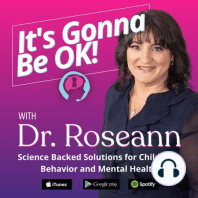35 min listen
110: Autism Myths
FromScience Backed Solutions for Children’s Behavior and Mental Health
ratings:
Length:
16 minutes
Released:
Aug 28, 2023
Format:
Podcast episode
Description
Many widespread myths and misconceptions about autism prevent kids from getting proper diagnosis which means that they are also not getting the right help. Certainly, the effects of these myths spread across the lives of individuals on the autism spectrum and their families, influencing how they are perceived, how they interact with others, and also affecting their overall quality of life.By debunking these myths, we create an environment where individuals with autism can be understood and embraced for who they are, fostering a more inclusive society. That is why this episode is important for parents as debunking these myths are crucial for accurate diagnosis and intervention. Myth about only boys having autism.One of the most common myths about autism is that only boys are suffering from autism. There are indeed many boys who have autism but that does not mean that they are the only ones who are diagnosed with it. Boys are easily diagnosed considering that they tend to have coordination issues. While it is true that a notable number of boys are diagnosed with autism, this myth perpetuates an inaccurate and limited understanding of the disorder's prevalence. Autism knows no gender boundaries. We must broaden our understanding of autism and challenge gender stereotypes associated with it. Is autism just a childhood condition?There is a misconception about the period of autism and whether or not it is just a childhood condition. Autism does not end in childhood and is rather a lifelong condition. The brain of an autistic just sees things differently and it doesn't end. Autism isn't something one simply outgrows. Recognizing autism as a lifelong condition is crucial for promoting inclusiveness, offering suitable assistance, and guaranteeing the well-being and success of individuals on the autism spectrum.People with autism don’t feel emotions. We often hear others say that people with autism don’t feel emotions but that is not true despite the fact that they may not show the same range of emotions because their interpretation of them is different.They don’t really perceive situations the same way that we do. As such, they’re not going to react in a way that we expect them to. For example, an autistic individual might experience sensory overload, where external stimuli become overwhelming, affecting their ability to process emotions effectively. Gastrointestinal issues are not common.Another big myth that I encounter a lot is that gastrointestinal issues aren't common for those with autism. In fact, that is one of the most common things we see. When the American Academy of Pediatrics updated all the guidelines after 12 years of not updating them, the rates of autism went through the roof and they finally admitted that this issue is very common. As for my experiences so far, I have never had an autistic that doesn't have gastrointestinal issues in their history. Studies have shown that individuals with autism are more likely to experience a range of gastrointestinal issues, including constipation, diarrhea, irritable bowel syndrome, and food sensitivities.People with autism can't make eye contact.There are people who think that if you don't make eye contact, you have autism. Some kids with autism do make eye contact but it is more common not to make eye contact.Other kids with sensory processing also don't make eye contact a lot. And as we know, many kids with autism have sensory processing but many kids with sensory processing don’t have autism.It's important to recognize that eye contact is just one of the many elements within a wide spectrum of behaviors. While some individuals with autism may exhibit challenges with making direct eye contact, others may engage in it naturally, and the reasons behind these behaviors
Released:
Aug 28, 2023
Format:
Podcast episode
Titles in the series (100)
20: Fasting for Anxiety and Depression by Science Backed Solutions for Children’s Behavior and Mental Health
